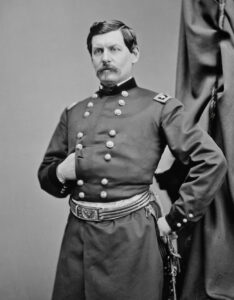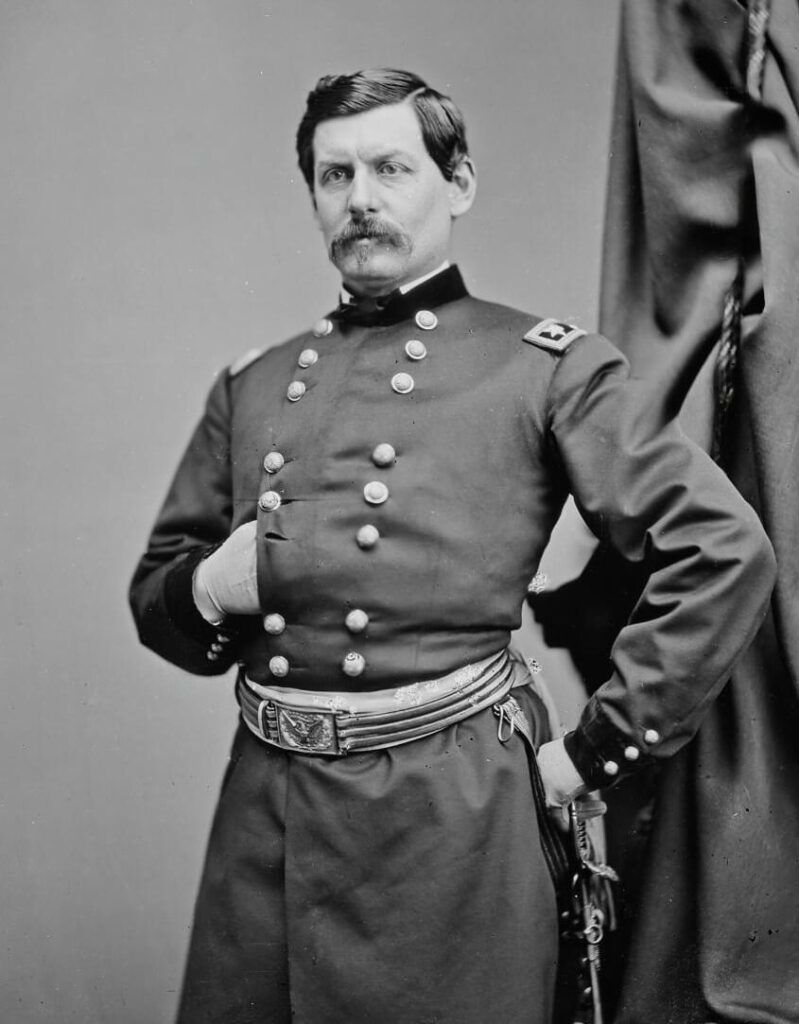Interview: Little Mac
 Recently I had the honor of interviewing General George Brinton McClellan via Zoom. A figure of considerable controversy, and declared the worst general of the Civil War by no less an authority than his biographer Stephen W. Sears, McClellan created the Army of the Potomac and was idolized by his men.
Recently I had the honor of interviewing General George Brinton McClellan via Zoom. A figure of considerable controversy, and declared the worst general of the Civil War by no less an authority than his biographer Stephen W. Sears, McClellan created the Army of the Potomac and was idolized by his men.
Interviewer: Thank you, General McClellan, for agreeing to this interview. I realize that it was a logistical stretch.
GBM: Tut tut; I can do it all.
KG: Does it surprise you that I have chosen you for my first interview?
GBM: Not in the least. One naturally chooses the best general of the war—even ignorant small fry like yourself.
KG: Actually, General Sir, you were chosen for exactly the opposite reason. Our most reliable authority on you, and on your greatest battle, Stephen Sears, has identified you as the worst general of the war. Comments?
GBM: I have not heard of this individual, nor do I recognize his authority, Sir!
KG: Did you recognize President Lincoln’s authority?
GBM: Barely. “The original gorilla.” Note, however, that although I did not respect the man, I respected the office, and acceded to my dismissal from command. I hear you mumbling. What did you say?
KG: All due respect, Sir; but I am wondering if Mr. Lincoln was “The Original Gorilla,” what are you?
GBM: You are impertinent, Sir. Manifestly, you are ignorant that a greater authority than you—namely General Robert E. Lee—considered me the best Union general he faced, due in large part to the originality of my Peninsular Campaign.
KG: I am sure that General Lee was very appreciative of you, Sir.
GBM: I remind you that sarcasm is out of place in an interviewer.
KG: Apologies. But I am speaking to you from the 21st century. This is an un-civil era.
GBM: So I conclude. Perhaps you would even wish to continue on a first name basis!
KG: That would be most congenial. I am thinking of how your troops called you “Little Mac.”
GBM: That is correct. The nickname demonstrated my soldiers’ affection for me.
KG: I am wondering, Little, why they felt affection for you.
GBM: It was due to my affection for them! I cared for them. I organized, trained, fed, clothed, and inspired them. The Army of the Potomac was my creation. The men admired and loved me.
KG: But they didn’t vote for you in 1864 when you ran against Mr. Lincoln for the presidency.
GBM: Massive election fraud. I have not come here to be insulted, Sir!
KG: Where do you usually go?
GBM: One more disrespectful wisecrack and I’m on my way back to New Jersey.
KG: Wait, Sir, if you please! I apologize for my inappropriate attitude. My generation has been imbued with a disrespectful view of you. But my intention is actually somewhat to rehabilitate the impression of your character.
GBM: Oh? Say more.
KG: I have one vital question to ask you.
GBM: Which is?
KG: Did you really believe the reports of enemy troop strength that you received from Mr. Pinkerton, and that you reported to Washington?
GBM: Of course I did. Clever, loyal old Pinky! I suppose you will accuse me of paranoia, or at the very least of “self-servingly pessimistic” thinking.
KG: Au contraire, mon General! By the way, why did you pose with your hand partly inside your uniform coat? From where we sit, here in the 21st century, that looks a little sketchy.
GBM: That is my Napoleonic pose, idiot. I was called the Little Napoleon.
KG: See, either way, the first name is Little.
GBM: Merde!
KG: My point, General, is favorable to you. Someone whose name shall not be mentioned termed the Army of the Potomac “McClellan’s bodyguard.” But my thesis is this: If you really believed that you faced an army double the size of yours, it was in fact brave of you to advance on Richmond.
GBM: Splendidly brave!
KG: And to attack Lee’s army all day at Antietam.
GBM: That battle was a masterpiece of art, if I must say so myself.
KG: You must say so yourself, Little, because nobody else says it. However, I respectfully salute your courage in attacking an army you thought vastly outnumbered your own.
GBM: The Republic depended upon not only the success of my army, but upon its survival. I saved the country, Sir!
KG: Certainly the men under you did; and perhaps to some extent you did also.
GBM: A great compliment coming from you, insect.
KG: Takes one to know one.
GBM: We’re done here. You got a problem with me, you come up to Bayonne and tell me to my face, you know what I’m sayin’?
Due to limitations of space, we must end the interview here. This blog accepts no responsibility for the content of this possibly spurious interview. Until next time, All quiet along the Potomac.

Recently I had the honor of interviewing General George Brinton McClellan via Zoom. A figure of considerable controversy, and declared the worst general of the Civil War by no less an authority than his biographer Stephen W. Sears, McClellan created the Army of the Potomac and was idolized by his men.
Interviewer: Thank you, General McClellan, for agreeing to this interview. I realize that it was a logistical stretch.
GBM: Tut tut; I can do it all.
KG: Does it surprise you that I have chosen you for my first interview?
GBM: Not in the least. One naturally chooses the best general of the war—even ignorant small fry like yourself.
KG: Actually, General Sir, you were chosen for exactly the opposite reason. Our most reliable authority on you, and on your greatest battle, Stephen Sears, has identified you as the worst general of the war. Comments?
GBM: I have not heard of this individual, nor do I recognize his authority, Sir!
KG: Did you recognize President Lincoln’s authority?
GBM: Barely. “The original gorilla.” Note, however, that although I did not respect the man, I respected the office, and acceded to my dismissal from command. I hear you mumbling. What did you say?
KG: All due respect, Sir; but I am wondering if Mr. Lincoln was “The Original Gorilla,” what are you?
GBM: You are impertinent, Sir. Manifestly, you are ignorant that a greater authority than you—namely General Robert E. Lee—considered me the best Union general he faced, due in large part to the originality of my Peninsular Campaign.
KG: I am sure that General Lee was very appreciative of you, Sir.
GBM: I remind you that sarcasm is out of place in an interviewer.
KG: Apologies. But I am speaking to you from the 21st century. This is an un-civil era.
GBM: So I conclude. Perhaps you would even wish to continue on a first name basis!
KG: That would be most congenial. I am thinking of how your troops called you “Little Mac.”
GBM: That is correct. The nickname demonstrated my soldiers’ affection for me.
KG: I am wondering, Little, why they felt affection for you.
GBM: It was due to my affection for them! I cared for them. I organized, trained, fed, clothed, and inspired them. The Army of the Potomac was my creation. The men admired and loved me.
KG: But they didn’t vote for you in 1864 when you ran against Mr. Lincoln for the presidency.
GBM: Massive election fraud. I have not come here to be insulted, Sir!
KG: Where do you usually go?
GBM: One more disrespectful wisecrack and I’m on my way back to New Jersey.
KG: Wait, Sir, if you please! I apologize for my inappropriate attitude. My generation has been imbued with a disrespectful view of you. But my intention is actually somewhat to rehabilitate the impression of your character.
GBM: Oh? Say more.
KG: I have one vital question to ask you.
GBM: Which is?
KG: Did you really believe the reports of enemy troop strength that you received from Mr. Pinkerton, and that you reported to Washington?
GBM: Of course I did. Clever, loyal old Pinky! I suppose you will accuse me of paranoia, or at the very least of “self-servingly pessimistic” thinking.
KG: Au contraire, mon General! By the way, why did you pose with your hand partly inside your uniform coat? From where we sit, here in the 21st century, that looks a little sketchy.
GBM: That is my Napoleonic pose, idiot. I was called the Little Napoleon.
KG: See, either way, the first name is Little.
GBM: Merde!
KG: My point, General, is favorable to you. Someone whose name shall not be mentioned termed the Army of the Potomac “McClellan’s bodyguard.” But my thesis is this: If you really believed that you faced an army double the size of yours, it was in fact brave of you to advance on Richmond.
GBM: Splendidly brave!
KG: And to attack Lee’s army all day at Antietam.
GBM: That battle was a masterpiece of art, if I must say so myself.
KG: You must say so yourself, Little, because nobody else says it. However, I respectfully salute your courage in attacking an army you thought vastly outnumbered your own.
GBM: The Republic depended upon not only the success of my army, but upon its survival. I saved the country, Sir!
KG: Certainly the men under you did; and perhaps to some extent you did also.
GBM: A great compliment coming from you, insect.
KG: Takes one to know one.
GBM: We’re done here. You got a problem with me, you come up to Bayonne and tell me to my face, you know what I’m sayin’?
Due to limitations of space, we must end the interview here. This blog accepts no responsibility for the content of this possibly spurious interview. Until next time, All quiet along the Potomac.
